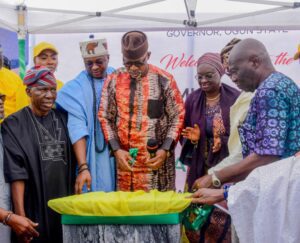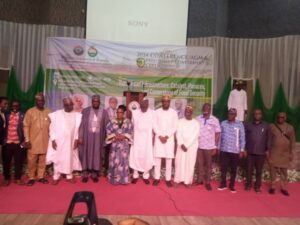


Food insecurity: Govs speak on strategies adopted to tackle hardship
Governors under the aegis of the Nigeria Governors Forum (NGF) have reeled out strategies their various states are adopting to end the current economic hardship and food crisis in their states.
In a report by its Acting Head of Media, Halimah Salihu Ahmed, on Sunday, the NGF reiterated that the governors are dedicated to alleviating the pain and suffering of citizens nationwide.
Recall that President Bola Tinubu met with state governors at the Presidential Villa in Abuja recently to discuss ways to alleviate the economic hardship faced by Nigerians following removal of fuel subsidy which resulted in a significant increase in the prices of essential goods and commodities.
According to the statement, Kwara State Governor and NGF chairman, Abdulrahman Abdulrazaq, along with Governors Agbu Kefas of Taraba State, Lucky Aiyedatiwa of Ondo State, and Ahmed Ododo of Kogi State, are advocating for enhanced crop production through collaboration with the Federal Ministry of Agriculture to tackle food shortages.
The statement revealed plans in Akwa Ibom for a state agency to procure and sell food items at lower prices. Similarly, in Kano and Yobe, authorities cracked down on food hoarding, banning bulk purchases and exports.
According to the report, Governors Mohammed Umar Bago of Niger State and Peter Mbah of Enugu State are tirelessly working to eliminate hunger and poverty by investing in agriculture and rural economic development.
The statement read in part, “In the same vein, in Kano State, authorities raided warehouses where traders are suspected of hoarding food supplies.”
“In Yobe, the State government banned bulk purchases of grain from local markets to stop hoarding and exports across Nigeria’s borders saying it was to stem the tide of food scarcity and high cost of grains.
“In Niger State Governor Mohammed Umar Bago announced a ban on the mass purchase of foodstuffs from local markets. He ordered security forces to confiscate trucks carrying products in bulk and share the food with the people.
“In Enugu State, Governor Peter Mbah said his administration will eradicate hunger and poverty in the state and unlock the rural economy through investment in agriculture and agro-industrialisation.
“In Zamfara state, last week, Governor Dauda Lawal hosted the Sweden Ambassador, Annika Hahn-Englund, in partnership on how to grow the state economy and address the current hardships.”
Governor Abdulrazaq also explained that the Anchor Borrowers Programme that was previously implemented by the Central Bank of Nigeria did not achieve much.
According to the statement, the NGF chairman said, “We could not achieve much with the CBN Anchor Borrowers program; it was very challenging. The issue of food security is a one-stop-shop and we need to concentrate on what we are doing. We need to concentrate on what we are doing for the dry season farming.”
It stated, “The minister has come up with a program on cassava, rice, and maize and we want to engage in that program and urgently make sure we improve on our yield and deliver to the Nigerian population.
“We want to get to a stage where we export our food. What we have now is that, because of the devaluation of our naira, Nigeria’s food is being exported to West Africa and is the cheapest in the region today.
“The governors had realised that we have a new Ministry of Agriculture, because over the last four years, before this administration, the engagement was not too productive,” he concluded.



